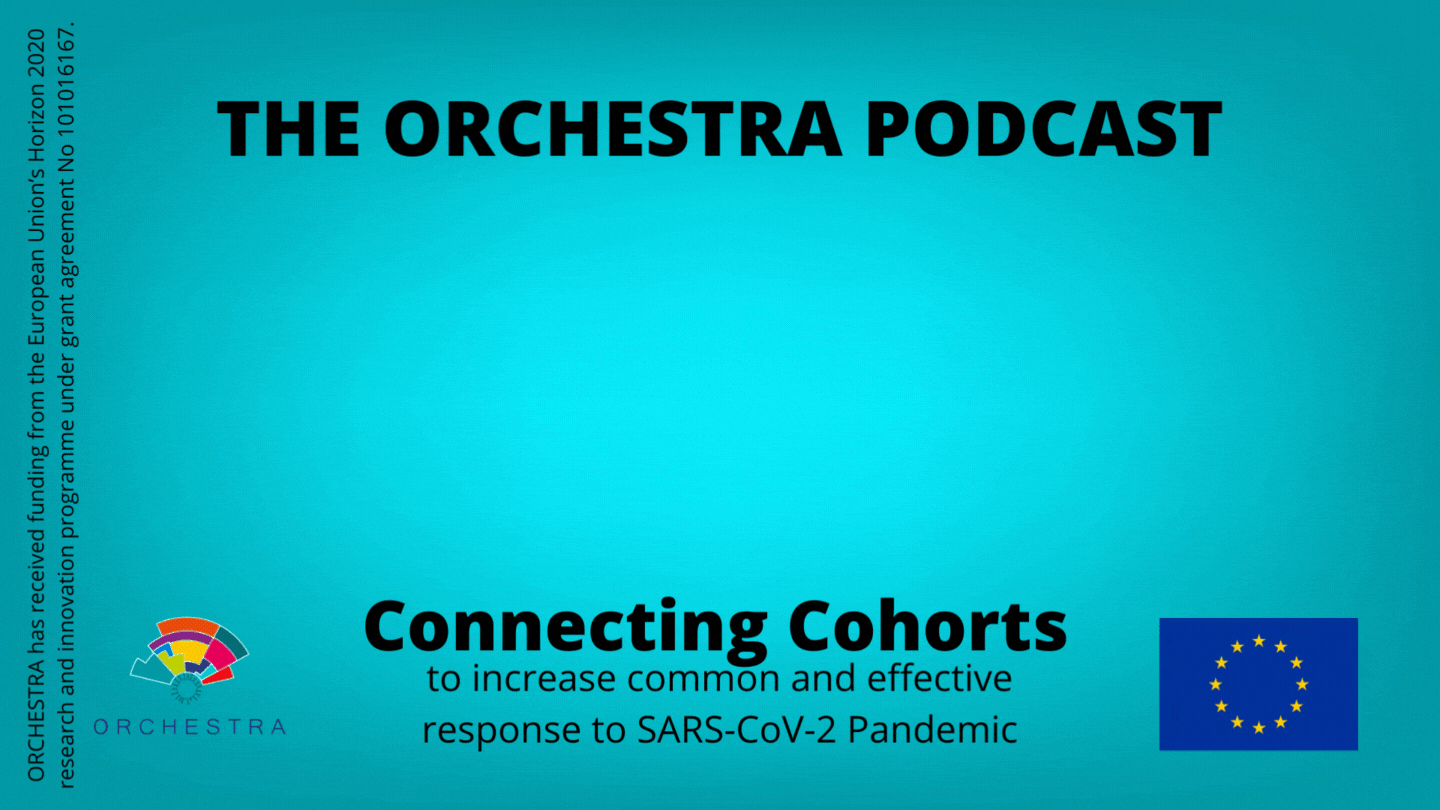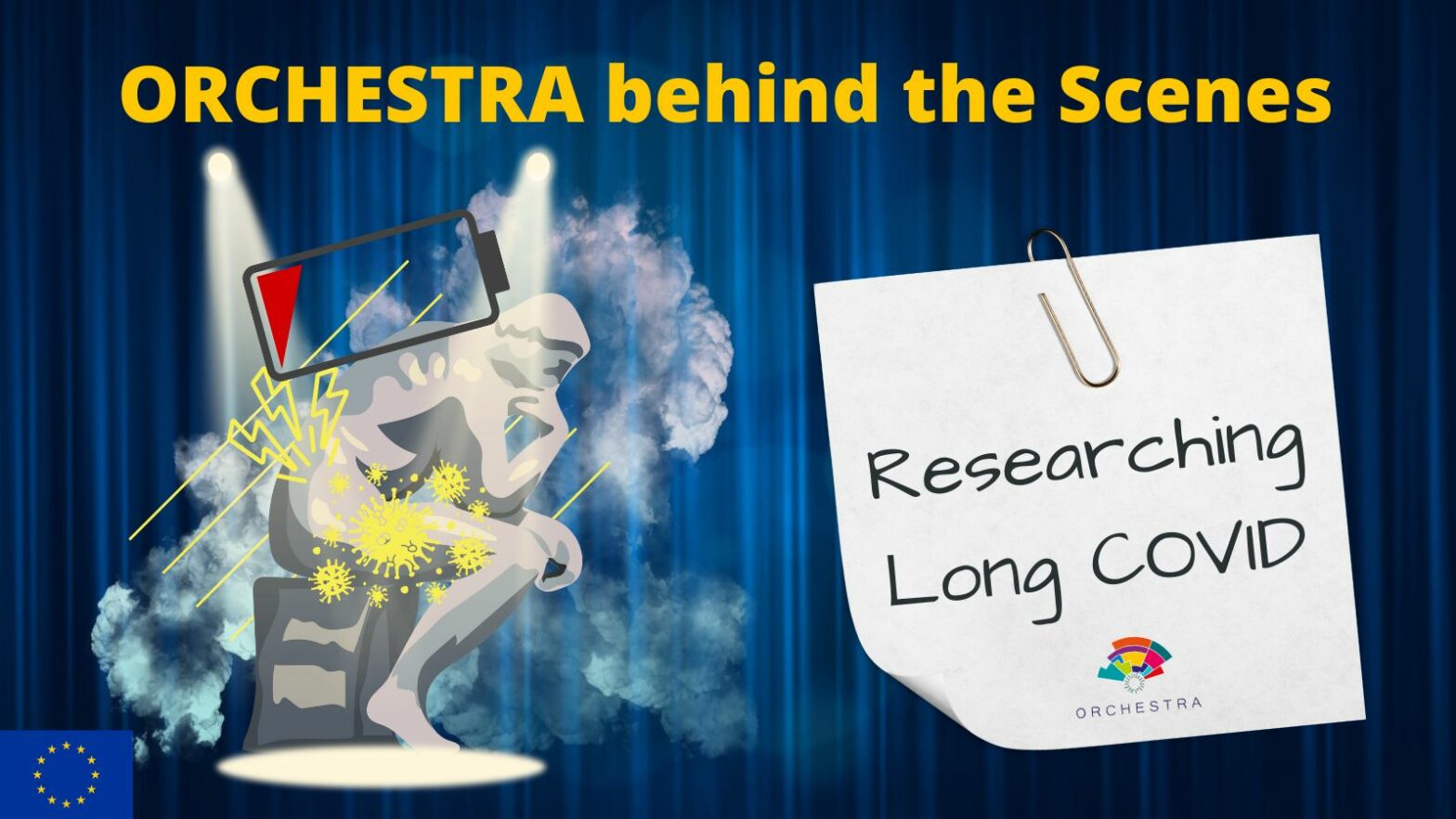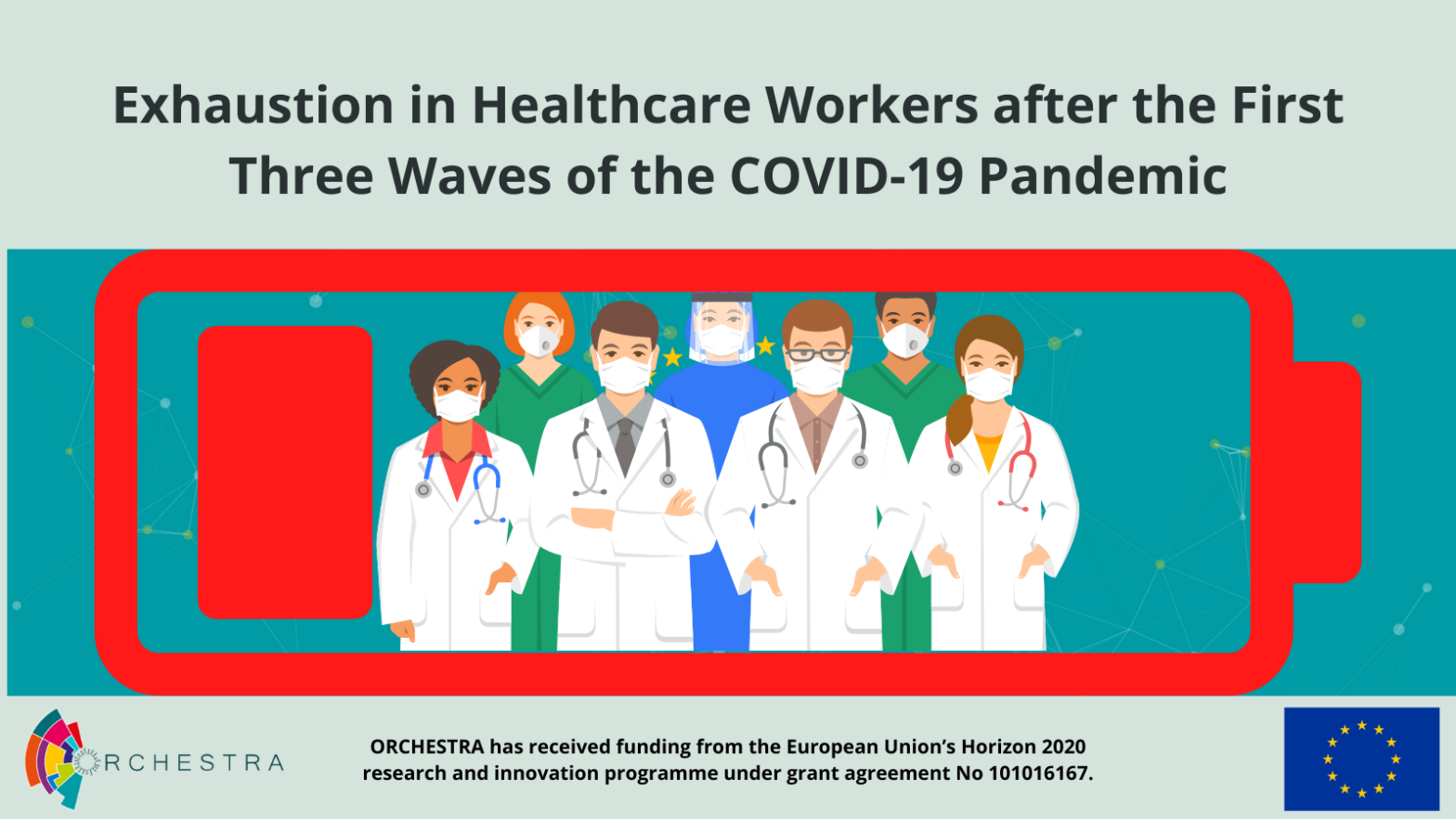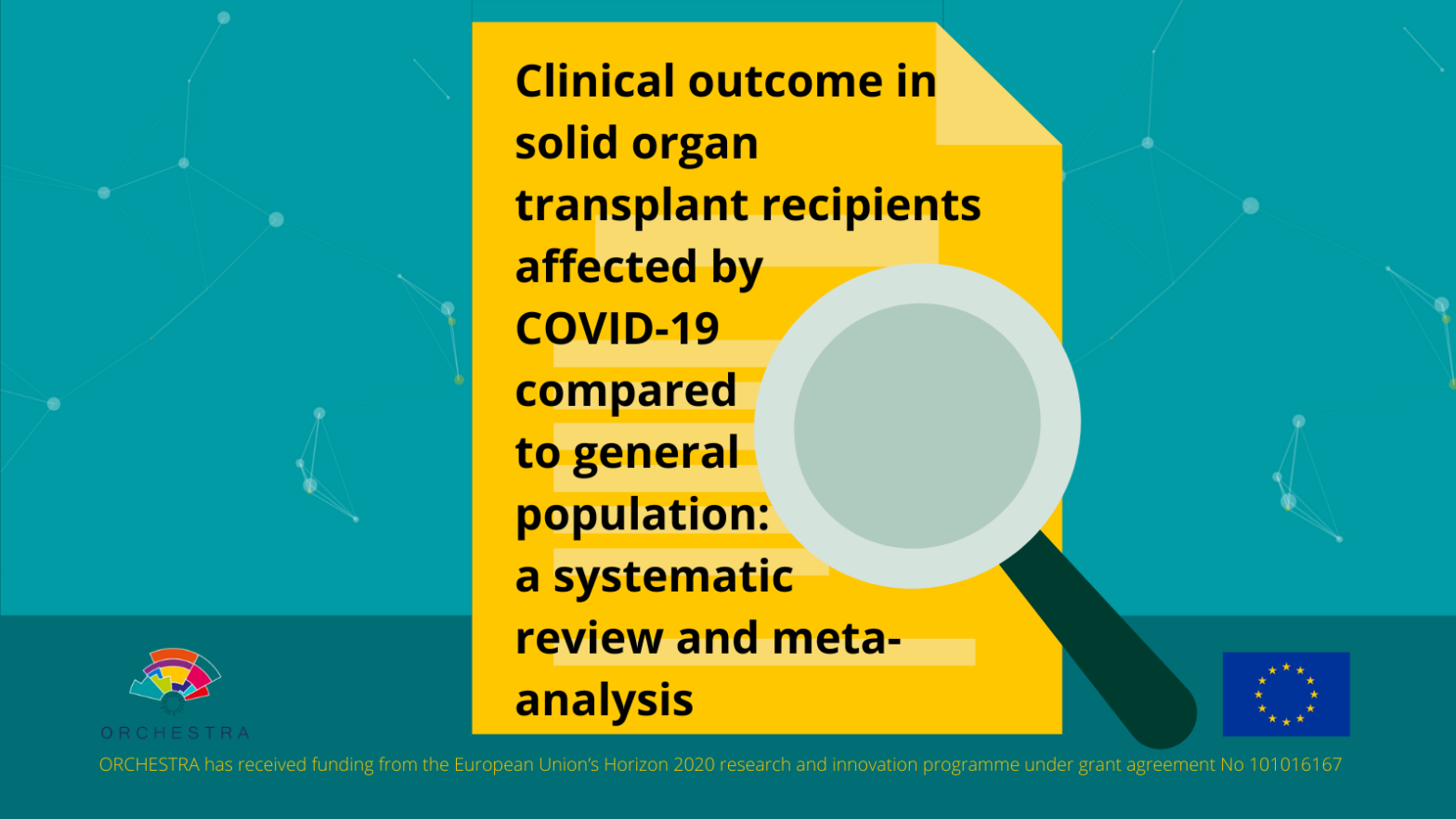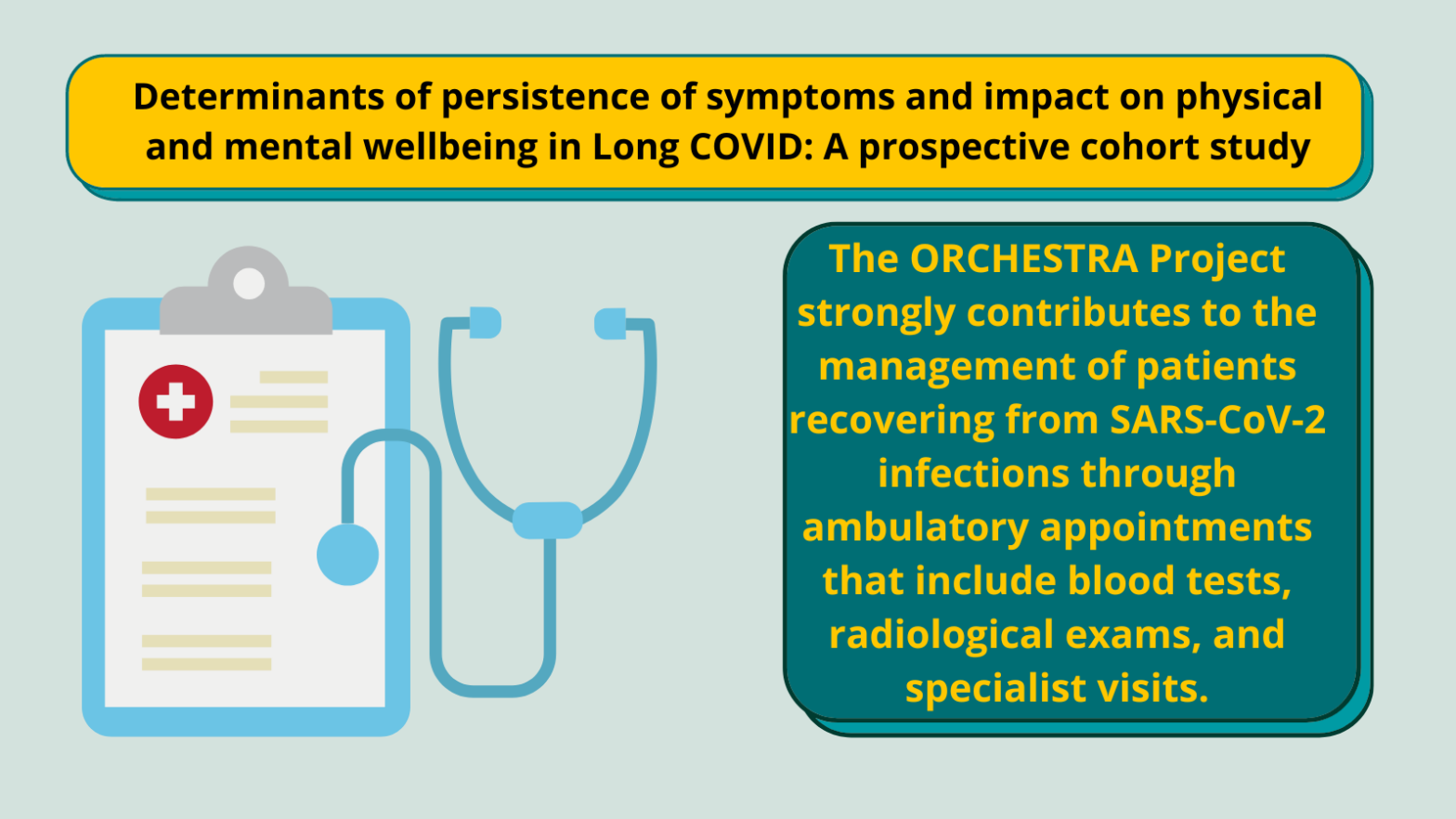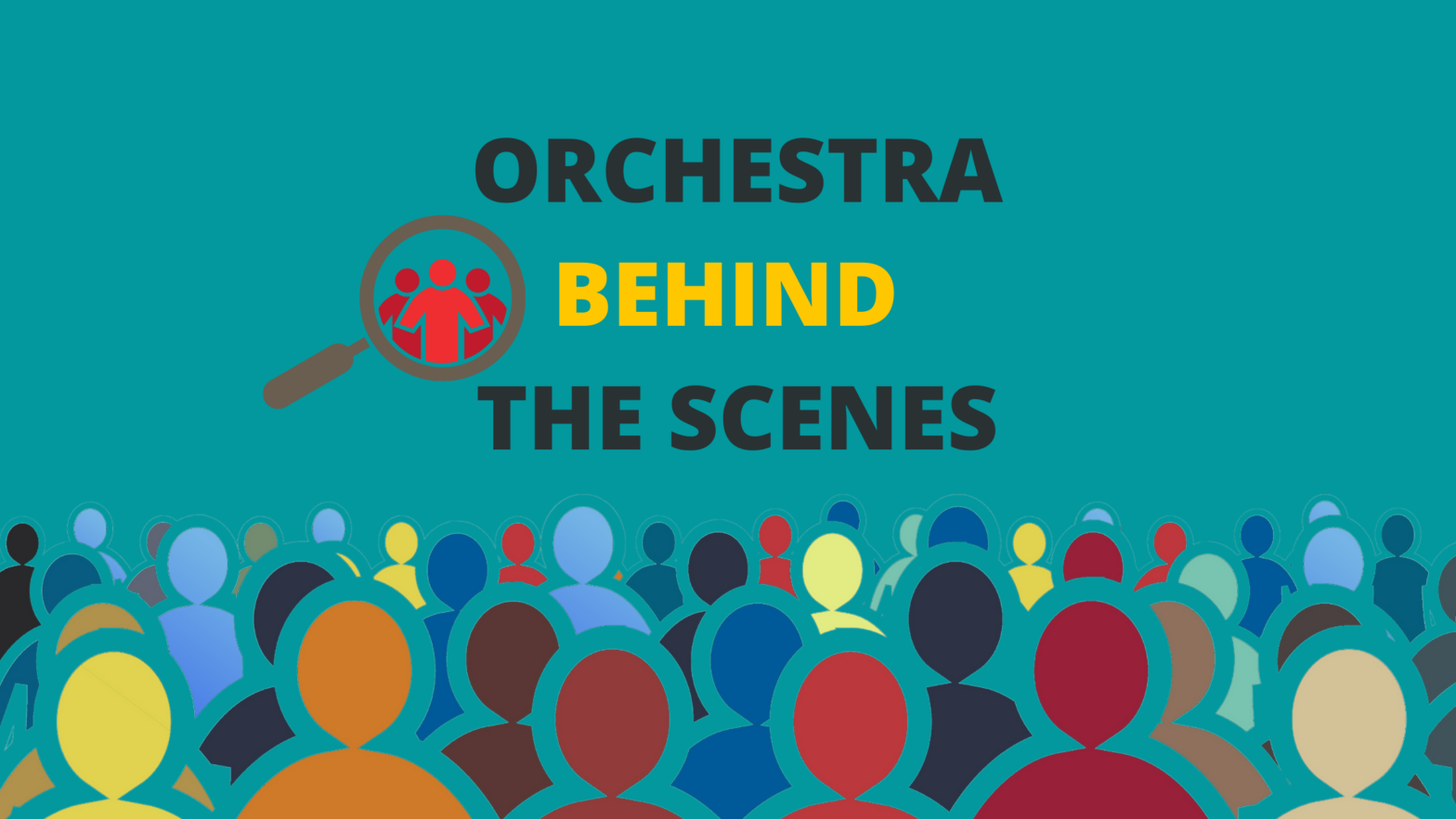Episode 2 – “Communication, Collaboration and Courage” are prerequisite for successful teamwork. We invited three very special guests, who have extremely meaningful and interesting careers, who contribute with their personal insights to “communication, collaboration and courage”: Prof. Evelina Tacconelli, the head of ORCHESTRA, Maestra Gabriella Carli, an international conductor and concert pianist, and Jules Grandsire, Head of all Internal Communication of the European Space Agency (ESA).
Author: marlene.nunnendorf
The ORCHESTRA-PODCAST: Presenting ORCHESTRA
Episode 1 presents ORCHESTRA and gives an overview of the project and its mission. Nobody knows ORCHESTRA better than Prof. Evelina Tacconelli. She talks about benefits, challenges and how her team convinced her to apply for the European cohort research project on COVID-19. Evelina Tacconelli is the head of ORCHESTRA, professor of infectious diseases at the University of Verona and director of the infectious diseases section at Verona University Hospital. She is a consultant on infectious diseases research of the University of Tübingen, DZIF, the German centre for infection research. She leads several international projects, targeting epidemiological and clinical aspects of antibiotic-resistant infections. Evelina initiated the ORCHESTRA project with her team from the University of Verona.
ORCHESTRA BEHIND THE SCENES 5
Long COVID is affecting large numbers of patients. What needs to be done to help them and how ORCHESTRA can work on clinical solutions is the topic of the interview with Professor Alex W. Friedrich the Medical Director and Chairman of the Board of the University Hospital Münster. Professor Friedrich is a medical specialist with specific expertise in infection prevention and control, lead of Work Package 9 “The global COVID-19 guidance”.
Exhaustion in Healthcare Workers after the First Three Waves of the COVID-19 Pandemic
Exhaustion in Healthcare Workers after the First Three Waves of the COVID-19 Pandemic
The study examined the most determining causes for exhaustion of frontline and second line healthcare workers (HCW) during the third wave of the COVID-19 pandemic. Responsible ORCHESTRA partner is the National Institute of Public Health (INSP) in Bucharest which contributes to Work Package 5, the Healthcare Workers Cohort.
Prof. Marina Otelea, is one of the authors and explains results and impact.
You used an anonymous questionnaire that was answered by about 1,800 first- and second-line Romanian Healthcare Workers. What was the most significant result that you found?
The most significant finding was that exhaustion was associated in both frontline and second line HCW with overcommitment and a perceived imbalance between effort and reward. Overcommitment, is getting involved in too much work, taking supplementary tasks to prove efficacy; however, it is an ineffective coping strategy to work pressure (work load, unsatisfactory interpersonal relations at work etc.) and not a solution. It is related to neuroticism and low job satisfaction.
Was there a difference in the level of exhaustion in between first row and second row healthcare workers? – There had been previous studies about frontline healthcare workers but this is the first study including second row healthcare workers, right?
There are not many studies comparing these two categories of HCW and the results are quite contradictory. In our study, the frontline HCW had a higher risk of exhaustion, but this risk was not negligible in second line HCW.
In your conclusion you found that front line HCWs were at higher risk for exhaustion than second line HCWs – yet, you found that frontline HCWs “managed better the content”. What do you mean by that?
The International Labour Organization (ILO) defines the content of work in terms of workload, work schedule, task design whereas the work context as organisational culture, role definition, interpersonal relations, carrier evolution. It looked like that, during the third wave, the work content was better re-organized/adapted for the frontline HCW, but still inefficient for the second line ones.
You used the Siegrist Model. What is it about?
The model considers that organisational stress derives from high workload and low reward (recognition of merits, respect, promotion, financial reward).
What kind of questions did you ask?
Questions related to the perceived effort and reward and also to overcommitment attitude (thinking constantly about work, lack of work-life separation etc.). Those questions aimed to investigate the stressors. The effect was the exhaustion, which was assessed with an adapted questionnaire form the initial Maslach questionnaire for burnout.
“The study was conducted in a healthcare system that is still poor according to European standards and covered a large spectrum of occupations in the medical sector, two distinctive characteristics that are approached rather infrequently in publications regarding the negative impact of the current pandemic in HCW [26].”. Do you have any other studies in ORCHESTRA to compare the different situations of HWCs across Europe?
Unfortunately, the other countries have used different measures for exhaustion and other types of influencers.
How can healthcare workers benefit from your study?
First, we have shown that the Siegrist questionnaire (which is free to use) is able to identify those at high risk of exhaustion. Secondly, it looks that the general measures, which were imposed on frontline HCWs were more efficient than the ones (less defined) for the second line HCWs. It also shows that the major responsibility and stress was on doctors, which is different from other countries in which nurses were the most stressed HCWs.
Are there any secondary gains from your study (e.g. can the determents be used for further studies)?
There might be, but we did not mention them in the article as they would be speculative in the strict interpretation of the results. For example, the fact that doctors were reporting the highest exhaustion might be the consequence of the too centralised decision system in the Romanian medical activity, in which nurse have very few autonomy and doctors have the responsibility for everything. It also shows the fear to take initiatives and to change the organisational model without a clear direction from authorities. And maybe the lack of managerial skills in the public healthcare sector.
Marina Otelea, is an Associate Professor in Occupational Medicine, University and Medicine and Pharmacy Carol Davila, Bucharest.
Interview by Marlene Nunnendorf, ORCHESTRA Science Communication Officer.
Please find the original study here: IJERPH
Clinical outcome in solid organ transplant recipients affected by COVID
Clinical outcome in solid organ transplant recipients affected by COVID-19 compared to general population: a systematic review and meta-analysis
The study was carried out through the collaboration of three ORCHESTRA partners, the University of Bologna (UNIBO), the University of Verona (UNIVR) and the Service Andaluz de Salud (SAS), and is one of the systematic reviews developed for Work Package 2, Task 2.2, led by SAS. It was published in Clinical Microbiology and Infection.
Five questions about the research to Maddalena Gianella, leader of Work Package 4, an associate professor at the Department of Medical and Surgical Sciences at the University of Bologna, and who provides the information on behalf of the team of Work Package 2.
What is the purpose of the study?
A significantly increased risk of complications and mortality has been described in immunocompromised patients affected by COVID-19. However, the effects of COVID-19 in solid organ transplant recipients (SOT recipipients) are still debated due to conflicting evidence from various observational studies. We wanted to investigate the evidence and provide clarity on this issue.
What was the method/what has been done to answer the purpose?
We performed a systematic review with meta-analysis to assess the clinical outcome in SOT recipients with COVID-19 compared to the general population. 3,501 articles were screened, and thirty-one observational studies were included in the meta-analyses. We evaluated the data sources PubMed-MEDLINE and Scopus. Both were independently searched until 13 October 2021. The study eligibility criteria (guidelines for who can or cannot participate in the study) were: Prospective or retrospective observational studies comparing clinical outcome in SOT recipients versus general populations affected by COVID-19. Primary endpoint was the 30-day mortality. Participants of the study were patients with confirmed COVID-19 exposure. The assessment of risk of bias was performed according to the ROBINS-I tool for observational studies.
What are the learnings?:
In our primary analysis, which included studies adjusting for confounding factors, we found no difference in the 30-day mortality rates. No evidence of publication bias was reported. Still, we found a higher risk of ICU admission and occurrence of acute kidney injury in SOT recipients.
What is your conclusion?
No increased risk in mortality was found in SOT recipients affected by COVID-19 compared to the general population when adjusted for demographic and clinical features and COVID-19 severity.
What are the benefits for the public? This finding can inform public health in potential complications and clinical course of COVID-19 in SOT patients.
Work Package 1: The Project Management Unit
ORCHESTRA’s mission is to bring together European and international partners in order to create larger cohort research for collaborating on a clearer picture of COVID-19 to find evidence based medical recommendations. 37 partners from 15 countries join work forces to achieve this goal. Only a well organised research infrastructure with common standards can facilitate serious research of this size. International teams of specialists from different professional backgrounds are assigned to eleven work packages – each entrusted with important tasks (which inspired the project’s name ORCHESTRA). Obviously, this endeavour requires a great amount of coordination, which is in the hands of Work Package 1 (WP1), the project management unit.
WP1 is ORCHESTRA’s “ground control” and provides continuous support to the partners in all aspects of project management, supervises adherence to the Grant Agreement, Consortium Agreement and Publication Policy, facilitates the flow of information between the ORCHESTRA partners and the many stakeholders. Currently, WP1 is also working on the internal financial reporting. This is a valuable practice for helping partners monitor their expenditure and it will facilitate partners when it comes to the official financial reporting activity to the European Commission due this summer. The next important task will be the official project reporting to the European Commission, requiring all the partners to report financial expenses and scientific activities performed in the first 18 months of the project. The team of WP1 describes their work challenge: “Coordinating such a big Consortium is a continuous challenge given the changes and adjustments needed to keep the project updated with the constantly evolving epidemiological situation. These changes indeed have impacted not only the scientific research but also the administrative and financial management of the project.”
The lead of this work package has a team from the University of Verona.
The persistence of symptoms after infection with SARS.
The persistence of symptoms after infection with SARS-CoV-2 can last for many months and has been defined as a clinical entity called Long COVID. Long COVID affects patients with numerous symptoms such as fatigue, headaches, breathing difficulties, difficulty concentrating (“brain fog”), chest pain and many more, which impair daily life. “Determinants of symptom persistence and impact on physical and mental well-being in long COVID: A prospective cohort study” is a study investigating the health status of patients after COVID-19 infection. The University of Verona (Italy) enrolled over 400 patients who were hospitalised or treated at home for COVID-19 and whose symptoms, particularly muscle pain, fatigue and breathing difficulties, persisted for up to 9 months after the acute illness. Physical and psychological well-being was influenced by the duration and number of symptoms, and factors such as ICU hospitalisation and age had an impact favouring Long COVID. Our findings encourage follow-up of patients at risk of Long COVID. The ORCHESTRA project makes an important contribution to the management of patients recovering from SARS-CoV-2 infection by providing outpatient appointments for blood tests, radiological examinations and specialist visits.
ORCHESTRA BEHIND THE SCENES 4
ORCHESTRA is an international project about cohort research on COVID-19. The larger the patient number in the cohorts, the greater becomes the chance of creating a wide clinical picture of the disease. This is why ORCHESTRA is open to collaborate with external cohorts and what motivates external cohorts to join ORCHESTRA. Seamas Donnelly, Professor of Medicine at Trinity College, Dublin, Ireland, took initiative earlier this year. He looked at the website of the European Commission to find out about medical initiatives, found and contacted ORCHESTRA, spread the news within a network of two prominent Dublin hospitals (The St James’s, Tallaght University Hospital, Trinity Alliance for Research – STTAR), joined ORCHESTRA and holds the lead of the Irish Cohort within ORCHESTRA.
ORCHESTRA BEHIND THE SCENES 3
Cohort research plays an important role in the international efforts of COVID-19 research and it is the core of ORCHESTRA’s network. – But what exactly is cohort research about? This interview with Prof. Janne Vehreschild provides an overview of meaning, chances and challenges of cohort research in general and of ORCHESTRA in particular. Janne Vehreschild has the lead of ORCHESTRA partner University Hospital of Cologne (UHC), and brings in extensive experience in the field of cohort research in different medical disciplines.
ORCHESTRA BEHIND THE SCENES 2
Keeping patient data as secure as possible is a central concern in the implementation of the ORCHESTRA network. Work Package 7, responsible for data management, addresses this task. The interview with Prof. Dr. Fabian Prasser from partner Berlin Institute of Health @Charité provides an insight into the challenges and the implications of the project for future research collaboration – and shows the importance of communication between the different partners.

